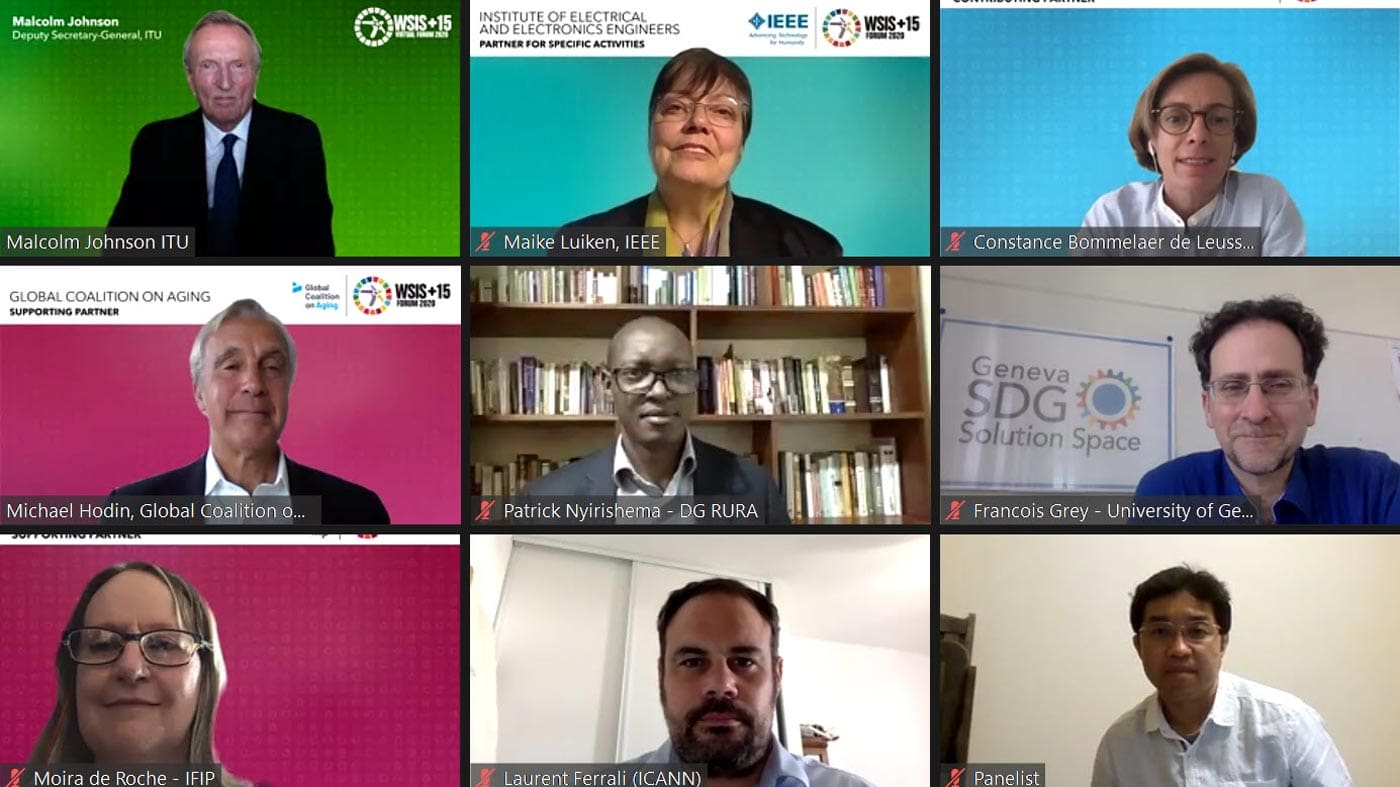Information and communication technologies (ICTs) form the backbone of today’s digital economy, with an enormous potential to accelerate progress on the United Nations Sustainable Development Goals (SDGs) and improve people’s lives in fundamental ways—from providing access to education resources and healthcare, and fostering digital services and inclusion, to making communities more sustainable.
In order to enable ICT-based solutions, a crucial question needs to be answered: what measures can be taken to ensure that ICTs are developed and implemented with appropriate considerations for environmental sustainability and human well-being?
The World Summit on the Information Society (WSIS) Forum 2020 was held online from 22 June to 10 September, bringing together the largest gathering of the ICT community to discuss the achievement of WSIS Action Lines in implementing ICTs toward the SDGs. As a Specific Activity sponsor to the WSIS Forum, IEEE participated in several sessions including the High-Level Policy sessions, hosting a Thematic workshop on How to Make Tech Development Work for Sustainable Development, and IEEE volunteers serving as High-Level Track Facilitators.
When looking specifically at tools and measures in support of ICT development and implementation, with environmental sustainability and human well-being in mind, they need to include:
- Standards, including standards for ‘ethics in design’
- Design for sustainability
- Data governance and management
- Resource management
- Training and education
- Policies and regulation
Standards Development for ICT Enablement
One measure that can be taken to ensure that ICTs are developed and implemented with appropriate considerations for environmental sustainability and human well-being is the development and adoption of standards. This is of pivotal importance to the successful deployment of ICTs.
Global, open standards play a prominent role in our lives and our economies. They are the unseen enabler behind innovation and successful global deployment of technology and services.
IEEE cultivates collaboration and convenes people from diverse backgrounds and industry sectors in a unique borderless, transparent standardization paradigm to develop market-relevant, open standards. IEEE 802.11™ Standard for Information Technology, for example, is used globally for wireless communication.
IEEE working groups are developing green ICT standards, such as standards that aim to limit the power consumption of some wireless ICT devices, address green storage technology, and support distributed energy efficient big data processing.
Other IEEE working groups are developing standards that explicitly focus on societal and ethical issues associated with a certain field of technology. The IEEE P7000™ standards series covers AIS-related topics such as ethically-driven nudging, child and student data governance, human well-being, and algorithmic bias considerations.
Sustainability by Design
Another measure that can be taken to ensure that ICTs are developed and implemented appropriately is to recognize that consideration for sustainability needs to be at the start in the design phase–all aspects of sustainability need to be part of the design parameters of new technologies and services.
Examples of such considerations would be
- ‘Privacy by Design’ or equivalent
- Design for minimal energy consumption and/or minimal GHG emissions, design for longevity
- Circular Design, Design for a Circular Economy or minimal waste and de manufacturability
- Maintainability and upgradability
While ICTs are critical to reaching the SDGs, and standards and design considerations can increase their contribution to sustainability, we must implement carefully so that we do not reverse progress in unintended and unanticipated ways.
Considering energy consumption: Specific applications such as Blockchain mining and the training of large AI models have been reported to be very energy intensive.
Even recent forecasts on ICT’s global life cycle GHG emissions footprint show significant divergence, although there is general agreement that the ICT carbon footprint has been mostly stable for the past few years and is not growing proportional to data growth as previously predicted, but rather with the number of subscriptions. This is attributed largely to changes in device footprint and user preferences changing from ‘large’ devices to the more energy efficient laptops, tablets, smartphones, etc.
New analyses and forecasts must be carried out frequently to permit effective development and deployment decisions.
ICT as Data Infrastructure
To help decrease energy use and increase sustainability, measures need to be taken to manage the data. One aspect to focus on is the stored data:
- Data integrity
- Reliable, redundant storage
- Data destruction at a pre-set date
- Elimination of multiple copies, ‘junk’ and ‘not-needed’ data
ICT is powerful infrastructure. It has the power to misinform on a global scale and deplete precious resources. But if managed carefully, it has the power to “green” many industries, to enable more equitable and ubiquitous access to services around the globe, and indeed become the infrastructure of sustainability.
Author: Maike Luiken, IEEE Head of Delegation and 2020 IEEE Member & Geographic Activities (MGA) Chair-Elect









